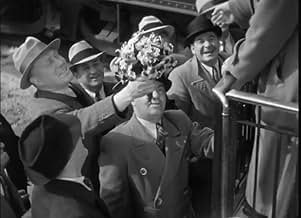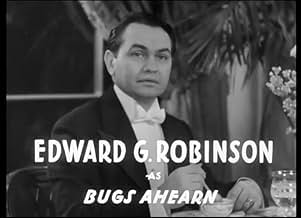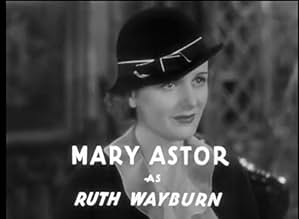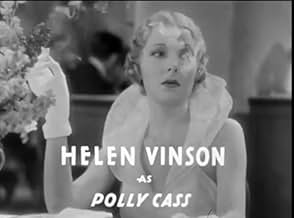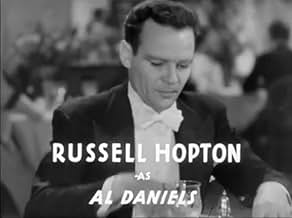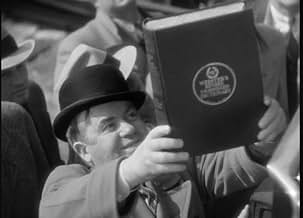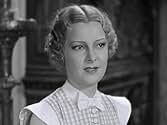ÉVALUATION IMDb
7,0/10
1,5 k
MA NOTE
Lorsque la prohibition prend fin, un baron de la bière voit l'écriture sur le mur, quitte les raquettes et tente de s'introduire dans la société californienne.Lorsque la prohibition prend fin, un baron de la bière voit l'écriture sur le mur, quitte les raquettes et tente de s'introduire dans la société californienne.Lorsque la prohibition prend fin, un baron de la bière voit l'écriture sur le mur, quitte les raquettes et tente de s'introduire dans la société californienne.
- Prix
- 2 victoires au total
Don Dillaway
- Gordon Cass
- (as Donald Dillaway)
Loretta Andrews
- Society Girl
- (uncredited)
Bonnie Bannon
- Society Girl
- (uncredited)
Joan Barclay
- Society Girl
- (uncredited)
Max Barwyn
- Headwaiter
- (uncredited)
Sidney Bracey
- Butler
- (uncredited)
Harry C. Bradley
- Harry S. Winter
- (uncredited)
Lynn Browning
- Society Girl
- (uncredited)
Joe Caits
- One of Bugs' Mugs
- (uncredited)
Maxine Cantway
- Society Girl
- (uncredited)
Avis en vedette
How can one not love a great Edward G. Robinson flick? Here he plays a Chicago gangster named 'Bugs' looking to go straight, with a seemingly unhealthy obsession with mingling with "high society" people.
Of course he gets out to California with his buddy, and while keeping his old gangster life a secret, gets involved with a woman who, along with her family, wants to swindle him out of his money. Like a fish out of water, Bugs is out of his element and can't see the scam against him, so blinded by the pretty woman.
The real hilarious thing about "The Little Giant" is that after Bugs realizes he's been scammed, the gangsters then turn into the good guys to make things right. This being a comedy, we laugh as the gangsters even use torture (!) to set things straight, all while cracking jokes. Bugs even refers to the ones who swindled him as (insert gay slur here). Talk about pre-code!
As always, Edward G. Is non-stop, and the film is a tour-de-force for him to showcase his quick wit and razor-sharp delivery. Definitely worth a viewing.
Of course he gets out to California with his buddy, and while keeping his old gangster life a secret, gets involved with a woman who, along with her family, wants to swindle him out of his money. Like a fish out of water, Bugs is out of his element and can't see the scam against him, so blinded by the pretty woman.
The real hilarious thing about "The Little Giant" is that after Bugs realizes he's been scammed, the gangsters then turn into the good guys to make things right. This being a comedy, we laugh as the gangsters even use torture (!) to set things straight, all while cracking jokes. Bugs even refers to the ones who swindled him as (insert gay slur here). Talk about pre-code!
As always, Edward G. Is non-stop, and the film is a tour-de-force for him to showcase his quick wit and razor-sharp delivery. Definitely worth a viewing.
The Little Giant (1933)
By 1933 the gangster genre was in full blown maturity, and Warner Bros. Along with Edward G. Robinson were key to that. This is a lesser known movie but still a good one, two years after his phenomenal "Little Caesar." This time, they thought the genre had room for comedy, and it doesn't always take off. Robinson is good, and Mary Astor is also good in a very different way, though not always on the same page as Robinson.
Mostly this is part of the larger picture-there are better Warner Bros gangster films, but this one holds its own.
By 1933 the gangster genre was in full blown maturity, and Warner Bros. Along with Edward G. Robinson were key to that. This is a lesser known movie but still a good one, two years after his phenomenal "Little Caesar." This time, they thought the genre had room for comedy, and it doesn't always take off. Robinson is good, and Mary Astor is also good in a very different way, though not always on the same page as Robinson.
Mostly this is part of the larger picture-there are better Warner Bros gangster films, but this one holds its own.
Little Giant, The (1933)
*** (out of 4)
When F.D.R. gets elected President, Chicago bootlegger Bugs Ahearn (Edward G. Robinson) decides to get out of the business. He heads off to California where he plans on crashing into society and he thinks he's doing a good job but he doesn't realize that his love (Helen Vinson) is actually from a corrupt family that is just using him. THE LITTLE GIANT isn't a perfect movie and it's not really that funny either but it's impossible not to fall for its charm and especially the charm of Robinson. Most people will always remember Robinson for his tough guy roles but if you dig deeper into his filmmography you will see that he was actually able to play just about any type of character. This film is without question a spoof of his tough image but it works so well because you can believe Robinson in the part of the gangster but also believe him in the sillier stuff where he's trying to be a gentleman. There are some very good moments scattered throughout the film but I think the real highlight is in the final ten-minutes once Robinson realizes what has happened and he decides to bring a little Chicago out West. Vinson is also very good in her supporting role as she has no problem playing this brat and we get nice work from Russell Hopton and Kenneth Thomson. Mary Astor is also extremely charming as the woman who falls for Robinson, although he doesn't know it at first. Both actors are so good together that the film actually drags a bit when they're not together. Fans of Robinson or the Warner gangster pictures are certainly going to want to check this out just to see the studio and star spoofing themselves.
*** (out of 4)
When F.D.R. gets elected President, Chicago bootlegger Bugs Ahearn (Edward G. Robinson) decides to get out of the business. He heads off to California where he plans on crashing into society and he thinks he's doing a good job but he doesn't realize that his love (Helen Vinson) is actually from a corrupt family that is just using him. THE LITTLE GIANT isn't a perfect movie and it's not really that funny either but it's impossible not to fall for its charm and especially the charm of Robinson. Most people will always remember Robinson for his tough guy roles but if you dig deeper into his filmmography you will see that he was actually able to play just about any type of character. This film is without question a spoof of his tough image but it works so well because you can believe Robinson in the part of the gangster but also believe him in the sillier stuff where he's trying to be a gentleman. There are some very good moments scattered throughout the film but I think the real highlight is in the final ten-minutes once Robinson realizes what has happened and he decides to bring a little Chicago out West. Vinson is also very good in her supporting role as she has no problem playing this brat and we get nice work from Russell Hopton and Kenneth Thomson. Mary Astor is also extremely charming as the woman who falls for Robinson, although he doesn't know it at first. Both actors are so good together that the film actually drags a bit when they're not together. Fans of Robinson or the Warner gangster pictures are certainly going to want to check this out just to see the studio and star spoofing themselves.
Although the early sound era presented some problems - such as stationary camera shots with the actors nailed to their marks, and minimal use of background music resulting in long stretches of torpor - by 1931 most of these bugs had been corrected; thus the pre-censorship period of '31-'34 is chockfull of some of the most vigorous, creative and satisfying movies of Hollywood's Golden Age, however little-known many of them may be. LITTLE GIANT is one such hidden gem. A lightning-paced gangster comedy from the Warner-First National studio (where speed and economy were stylistic hallmarks), it's fast, funny and flippant in a manner that the decayed virgins of the Hays Office would render, if not impossible, at least awfully difficult after '34. Edward G Robinson plays Bugs Ahearn, a Chicago bootlegger put out of business by Prohibition's repeal, who decides to relocate to California and buy his way into society. Once there, he's immediately preyed upon by the type of 'respectable' vipers & parasites his background has left him ill-equipped to recognize, let alone fend off. This 'fish-out-of-water' comedy benefits greatly from a cheerfully amoral tone and a slew of zesty performances, not least of them Mary Astor's as a busted heiress who is the only non-hood here who's on the level. The mix of slapstick and rat-a-tat verbal comedy, coming at you at fast as it does, works very well, and nobody was better at this kind of hectic farce than the woefully-underrated Roy del Ruth, who was one of a number of sure & steady craftsmen who hit their peaks only under the Warners' aegis. In Del Ruth's case, the coming of the Code (and his subsequent move to MGM) proved to be disastrous: though he continued to direct till the late 50s, his post-Warners work was so drained of zest and inspiration that he is hardly remembered at all today. Even the auteurist crowd dismisses him as a competent hack. But do yourself a favor and seek out everything he did prior to 1935, and you'll be rewarded with a body of work that will surprise you with its cynical bite and confident staging. They play as well today as they did the day they opened. (Highly recommended, besides GIANT, are BLESSED EVENT, LADY KILLER, EMPLOYEES ENTRANCE & TAXI.)
And yet it is in one of the Warner Gangster DVD packs. This is one of those bizarre results from the whipsaw of events - age of DVD, great recession and resulting death of DVD, economic recovery and age of Blu and streaming -that put this relatively obscure film on DVD but leaves the three Show Boat films unrestored and in the Warner Archive. But I digress.
It may be obscure, but it is definitely worth your time. This is a comedy about a gangster, not a gangster film, as I said in my title. Robinson plays Bugs Ahearne, a Chicago gangster at the time of Roosevelt's 1932 election and, by extension, the death of prohibition. Ahearne is wise in that he sees the age of the mob and easy money from bootleg liquor is over, and divides his profits among his gang. Ahearne himself winds up with 1.25 million dollars. Multiply that by about 20 to get today's amount.
Ahearne has been planning for this day, and he has been reading the classics and improving himself. He plans to retire to California and become part of polite society. The problem is, outside of reading, Bugs has never talked to or known any society people in his life. Just like you can't learn to drive a car by just reading books, Bugs doesn't realize he sticks out like a sore thumb.
He also makes the mistaken calculation that people of "breeding" - whatever that is supposed to mean - and culture can be depended upon to be on the level, whether their motives are good or maybe not. Yet he is fooling the society people by pretending to be somebody else, wanting to leave his gangster roots behind. The result is an absolutely hilarious comedy of manners with tons of precode one liners, many of which I cannot repeat even in 2019.
And if you never thought Edward G. Robinson and Mary Astor could have great chemistry, maybe even be considered a comedy team, guess again. With great supporting performances. With a great understated performance by Russell Hopton as Robinson's best friend, who can't imagine life without the mob and tags along with "Bugs" for the ride. I guarantee you will never see polo as the same game again. Highly recommended.
It may be obscure, but it is definitely worth your time. This is a comedy about a gangster, not a gangster film, as I said in my title. Robinson plays Bugs Ahearne, a Chicago gangster at the time of Roosevelt's 1932 election and, by extension, the death of prohibition. Ahearne is wise in that he sees the age of the mob and easy money from bootleg liquor is over, and divides his profits among his gang. Ahearne himself winds up with 1.25 million dollars. Multiply that by about 20 to get today's amount.
Ahearne has been planning for this day, and he has been reading the classics and improving himself. He plans to retire to California and become part of polite society. The problem is, outside of reading, Bugs has never talked to or known any society people in his life. Just like you can't learn to drive a car by just reading books, Bugs doesn't realize he sticks out like a sore thumb.
He also makes the mistaken calculation that people of "breeding" - whatever that is supposed to mean - and culture can be depended upon to be on the level, whether their motives are good or maybe not. Yet he is fooling the society people by pretending to be somebody else, wanting to leave his gangster roots behind. The result is an absolutely hilarious comedy of manners with tons of precode one liners, many of which I cannot repeat even in 2019.
And if you never thought Edward G. Robinson and Mary Astor could have great chemistry, maybe even be considered a comedy team, guess again. With great supporting performances. With a great understated performance by Russell Hopton as Robinson's best friend, who can't imagine life without the mob and tags along with "Bugs" for the ride. I guarantee you will never see polo as the same game again. Highly recommended.
Le saviez-vous
- Anecdotes"Al" recounts a job where he shot up a stuffed Polar Bear. The same plot scene was depicted in The Public Enemy (1931) with "Tom" doing the shooting.
- GaffesThe image of the single-engine plane carrying Ahern's "boys" appears empty except for the pilot.
- Citations
James Francis 'Bugs': The toughest mug in Chicago comes out here and gets trimmed by a lot of fags with handkerchiefs up their sleeves.
- ConnexionsFeatured in Public Enemies: The Golden Age of the Gangster Film (2008)
- Bandes originalesChicago (That Toddlin' Town)
(1922) (uncredited)
Written by Fred Fisher
Played during the opening credits
Reprised when the gang comes to Santa Barbara
Reprised at the end
Meilleurs choix
Connectez-vous pour évaluer et surveiller les recommandations personnalisées
Détails
- Date de sortie
- Pays d’origine
- Langues
- Aussi connu sous le nom de
- Der kleine Gangsterkönig
- Lieux de tournage
- Hotel Del Monte, Monterey, Californie, États-Unis(Polo field location)
- société de production
- Consultez plus de crédits d'entreprise sur IMDbPro
Box-office
- Budget
- 197 000 $ US (estimation)
- Durée
- 1h 16m(76 min)
- Couleur
- Mixage
- Rapport de forme
- 1.37 : 1
Contribuer à cette page
Suggérer une modification ou ajouter du contenu manquant

